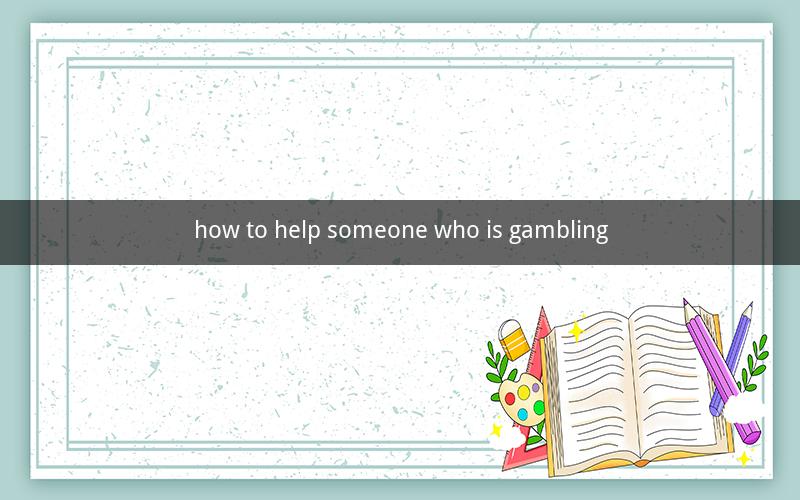
How to Help Someone Who Is Gambling
Table of Contents
1. Understanding the Problem
2. Recognizing the Signs
3. Communicating with the Gambler
4. Encouraging Professional Help
5. Setting Boundaries
6. Supporting the Gambler's Recovery
7. Educating Yourself
8. Building a Support Network
9. Coping with the Emotional Impact
10. Maintaining Long-Term Support
1. Understanding the Problem
Gambling addiction is a complex issue that can affect individuals of all ages, backgrounds, and socio-economic statuses. It is characterized by an inability to control gambling behavior, leading to significant negative consequences in various aspects of life, including financial, emotional, and social. To help someone who is struggling with gambling, it is crucial to have a clear understanding of the problem and its implications.
2. Recognizing the Signs
Identifying the signs of gambling addiction is the first step in providing support. Common signs include:
- Secretive behavior
- Borrowing money or selling possessions to fund gambling
- Missing work or school due to gambling
- Increasing debts
- Preoccupation with gambling
- Neglecting personal responsibilities
- Engaging in risky behavior to recover losses
3. Communicating with the Gambler
Open and honest communication is essential when addressing the issue of gambling addiction. Here are some tips for effective communication:
- Choose a quiet, private setting
- Express your concerns without judgment or confrontation
- Use "I" statements to avoid sounding accusatory
- Listen actively and without interruption
- Avoid placing blame or using ultimatums
4. Encouraging Professional Help
Professional help is often necessary for overcoming gambling addiction. Encourage the individual to seek support from:
- Therapists specializing in addiction
- Gamblers Anonymous or other support groups
- Counseling services offered by hospitals or clinics
5. Setting Boundaries
Setting clear boundaries can help protect both you and the gambler. Consider the following:
- Limiting access to gambling opportunities
- Preventing the individual from borrowing money
- Establishing a budget to cover essential expenses
- Monitoring financial transactions
6. Supporting the Gambler's Recovery
Supporting the gambler's recovery involves:
- Encouraging participation in treatment programs
- Offering to attend therapy sessions or support group meetings
- Providing emotional support during challenging times
- Celebrating milestones and progress
7. Educating Yourself
Educating yourself about gambling addiction can help you understand the problem better and offer more informed support. Consider the following resources:
- Books and articles on gambling addiction
- Online forums and support groups
- Workshops and seminars on addiction and recovery
8. Building a Support Network
A strong support network can provide encouragement and guidance during the recovery process. Here are some ways to build a support network:
- Reach out to friends and family
- Connect with other individuals who have experienced similar challenges
- Join support groups for loved ones of gamblers
- Seek guidance from professionals in the field
9. Coping with the Emotional Impact
The emotional impact of gambling addiction can be overwhelming for both the individual and their loved ones. Here are some coping strategies:
- Seek emotional support from friends, family, or professionals
- Practice self-care and stress management techniques
- Engage in activities that promote relaxation and well-being
- Consider joining a support group for loved ones of gamblers
10. Maintaining Long-Term Support
Long-term support is crucial for maintaining recovery. Here are some ways to ensure ongoing support:
- Regularly check in with the individual
- Continue to educate yourself about gambling addiction
- Encourage the individual to maintain connections with their support network
- Be prepared to offer support during relapse or setbacks
Questions and Answers
1. What are the signs of gambling addiction?
- Secretive behavior, increasing debts, preoccupation with gambling, and neglecting personal responsibilities are common signs.
2. How can I communicate with a gambler effectively?
- Choose a quiet, private setting, use "I" statements, and listen actively without interruption.
3. What types of professional help are available for gambling addiction?
- Therapists specializing in addiction, Gamblers Anonymous, and counseling services are some options.
4. How can I set boundaries to support the gambler's recovery?
- Limit access to gambling opportunities, prevent borrowing money, and establish a budget for essential expenses.
5. What can I do to support the gambler's recovery?
- Encourage participation in treatment programs, offer emotional support, and celebrate milestones.
6. How can I educate myself about gambling addiction?
- Read books, articles, and online resources, and attend workshops or seminars.
7. How can I build a support network for the gambler?
- Reach out to friends and family, connect with others who have experienced similar challenges, and join support groups.
8. What can I do to cope with the emotional impact of gambling addiction?
- Seek emotional support, practice self-care, and engage in activities that promote relaxation.
9. How can I maintain long-term support for the gambler?
- Regularly check in with the individual, continue to educate yourself, and encourage connections with the support network.
10. What should I do if the gambler relapses?
- Remain supportive and encourage the individual to seek help from their treatment program or support group.